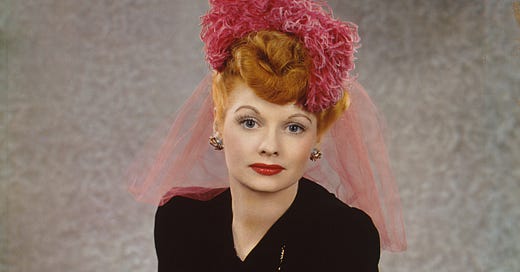It was the early 1950s, and "I Love Lucy" had America enraptured. The show was so popular that, as Lucille Ball, the star who played "Lucy" would say,
"In 1951-52, our show changed the Monday-night habits of America. Between nine and nine-thirty, taxis disappeared from the streets of New York. Marshall Fields department store in Chicago hung up a sign: 'We love Lucy too, so from now on we'll be open Thursday nights instead of Monday.' Telephone calls across the nation dropped sharply during that half hour, as well as the water flush rate, as whole families sat glued to their seats."
But in 1952, the show nearly came to a stop. Lucille was pregnant. She and her husband, Desi Arnaz, were expecting their second child. Joyful it was for the couple but problematic for the show, considering the societal taboos around depicting pregnancy on television. Sensing an opportunity to be bold and help shift social norms, the executives and writers wrote Lucille's real-life pregnancy into the show, though they used the word “expecting” instead of “pregnant.”
As Lucille's pregnancy unfolded on screen, the show handled it with warmth and humor, delighting viewers and adding to its immense popularity.
On January 19, 1953, Lucille gave birth to Desi Arnaz Jr., and just 12 hours later, 44 million viewers – 72% of American households – tuned in to see Lucy welcome Little Ricky into the world. The episode garnered more viewers than President Dwight D. Eisenhower's inauguration the following day.
Lucille was born in Jamestown, New York, on August 6, 1911. She was the firstborn child of Henry Durrell Ball and Desiree "DeDe" Evelyn Hunt. Dede, as the family called her, was a talented musician. "She could have been a fine concert pianist," but married at seventeen and had Lucille shortly after. Henry "was a wonderful guy, according to everyone who knew him: full of fun, with a good comic sense." Lucy's mother would say that's where her daughter's sense of humor came from.
Tragedy struck early in Lucille's life when her father passed away in 1915. This loss would have a profound impact on Lucille's childhood and life. For her mother, she now had to care for a daughter and Lucille's younger brother, who was born in the same year as their father's death. Financial struggles for the family came quickly.
But her mother worked hard and had some help from family members, including from Lucille. In her autobiography, Lucille wrote,
"DeDe was certainly a powerful example of a woman's dedication to her family. She could seldom get home from her job selling hats until six or six thirty, including Saturdays. So it was my job to make the beds, do the dusting, make sure the table was set, cook dinner, and do the supper dishes. Then DeDe would be up past midnight scrubbing and ironing clothes, mending and sewing. She had two dresses to her name, both black, which she kept brushed and clean, and wore with white collars or pearls. At this time, DeDe was thirty, still a handsome woman, with an infectious laugh.
Keep reading with a 7-day free trial
Subscribe to Historical Snapshots to keep reading this post and get 7 days of free access to the full post archives.




